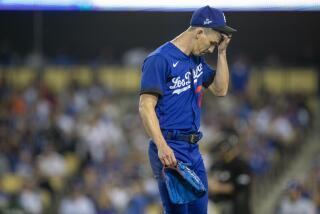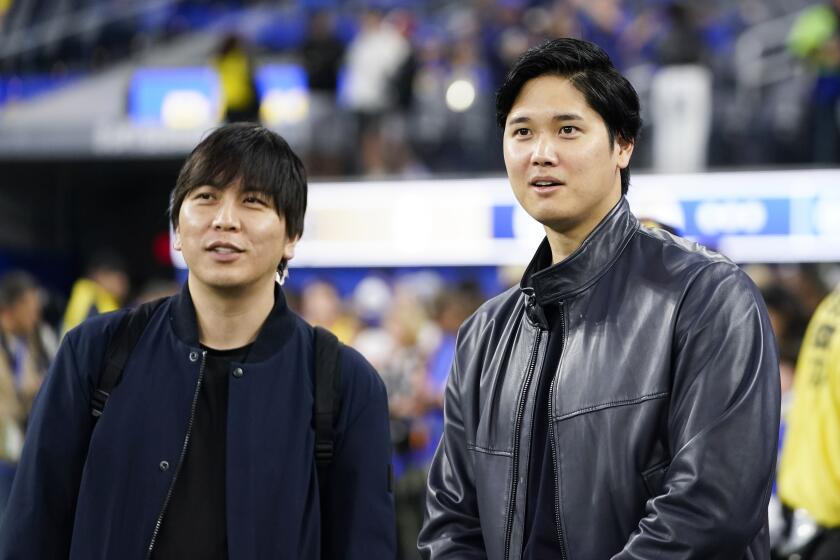Naming names
Former Sen. George Mitchell’s report on the use of performance-enhancing drugs in baseball will be made public today, ending 21 months of speculation about the names and details contained in its pages.
Mitchell, who was appointed by Commissioner Bud Selig to lead the investigation, will discuss his findings at a news conference in midtown Manhattan, set to start at 11 a.m. PST. Two-and-a-half hours later, Selig will hold his own news conference less than a mile away.
Anywhere from 60 to 80 players linked to drugs will be named in the 300-plus-page report, among them former MVPs and All-Stars, according to the Associated Press. Angels owner Arte Moreno told The Times last month that the report would name players “that people will be mad about.”
Various reports said the document would indicate that baseball has a widespread drug problem and would make recommendations about testing.
Dodgers General Manager Ned Colletti said Wednesday that he did not dread the disclosure of Mitchell’s findings, adding, “I think that integrity needs to be part of the game.”
But agent Scott Boras, who represents numerous high-profile players, argued that baseball’s definition of integrity is constantly changing.
“The integrity of baseball, or any sport, is defined by the rules that are set by the governance of the sport on both sides,” Boras said, referring to the owners and the players’ union.
Boras noted that because current drug-testing policy was set in 2005, “to make judgments on players and their conduct prior to 2005 is something we have to look very, very closely at. Certainly, players don’t deserve scrutiny doing something that was legal and in line with the integrity and the rules of baseball, and federal and state law.”
Human growth hormone was not banned or subject to penalty until 2005.
Boras said he hadn’t read the document but expressed skepticism of its merits because “the concerns of due process and the standards that apply to it are relatively unknown. Certainly, any results that occur from the report have to be looked at in the light that this is not a collectively bargained effort.”
A source told The Times on Tuesday that the commissioner’s office was reviewing the document in part to ensure that releasing its contents would not violate the collective-bargaining agreement.
“I’m going to assume that a lot of the basis for this is hearsay information,” Boras said. “It’s not based on any kind of clinical testing, so it is widely a product of hearsay testimony. Without clinical testing or hard evidence, any report like this has to be reviewed with great scrutiny.”
The bulk of the names in the document are widely thought to have been provided by Kirk Radomski, a former clubhouse attendant for the New York Mets who pleaded guilty to illegal steroid distribution and met with Mitchell this year as part of a plea bargain.
Mitchell’s investigation was hindered by a lack of cooperation from the players’ union. Jason Giambi is the only active player known to have spoken to Mitchell. Giambi is one of three active players associated with the BALCO investigation in San Francisco, the others being Gary Sheffield of the Detroit Tigers and home run king Barry Bonds, a free agent who is facing federal perjury charges.
But Kevin Dykstra, the brother of former Philadelphia Phillies and New York Mets outfielder Lenny Dykstra, was among those interviewed by Mitchell’s investigators and described them as being very thorough.
“These guys were very friendly, very professional and fair,” Kevin Dykstra said. “Their concerns were the steroids. How and why it happened, and how players were getting them, so they could prevent future abuse.”
In the Dykstra element of the investigation, Mitchell’s attorneys investigated his brother, a former business partner who sued the ballplayer over business matters, a former childhood friend in Arizona who claimed to have injected Dykstra, a Florida bodybuilder who claims to have injected the player, and at least two others with knowledge of his alleged abuses, Kevin Dykstra of Corona said.
Kevin Dykstra said he was contacted during the summer by Mitchell investigators who identified themselves as Jonathan King and Matt Hiller after he first met with baseball’s security director, Kevin Hallinan, to discuss his brother’s alleged baseball gambling activities. The brothers had a falling out over their car wash business.
Investigators were interested in Kevin Dykstra’s related information that his brother would sometimes fly to road games separately from his team and stay in separate five-star hotels, where he would host parties in which drugs were sometimes exchanged among top players from opposing teams.
He said Dykstra routinely circumvented unsupervised random tests for street drugs by having someone in the clubhouse take the test for him. Dykstra never tested positive.
Lenny Dykstra’s attorney, Daniel Petrocelli, said he rejected a request by Mitchell investigators to interview Dykstra.
“It’d be absurd for anyone to walk into an ambush, especially this one that is apparently being fueled by rumor and innuendo,” Petrocelli said.
He said he was denied the opportunity to see transcripts or to view documents related to his client in a letter sent by Mitchell.
“It seems more like the Salem witch trials than a proceeding with integrity,” Petrocelli said. “I told them they needed to be careful with the information they reported. They could be sued for defamation. I told them that, they’re not a judge, they’re lawyers. They have no right to defame, and that report better stick to the facts.”
Petrocelli said he had “never heard stories before,” and said Lenny Dykstra’s brother “has extreme animosity” and “issues” with the former ballplayer.
Mitchell reportedly didn’t make any recommendations on how players named in his document should be punished.
Selig has already suspended Jay Gibbons of Baltimore and Jose Guillen of Kansas City for 15 days each, based on information from a New York investigation linking each player to the use of performance-enhancing substances.
Selig did not suspend Gary Matthews Jr. of the Angels, Troy Glaus of Toronto, Rick Ankiel of St. Louis or Scott Schoeneweis of the New York Mets because of “insufficient evidence” linking those players to the use of specific substances during a time they were banned.
--
(BEGIN TEXT OF INFOBOX)
WHAT TO EXPECT
* Former Sen. George Mitchell will hold an 11 a.m. PST news conference in New York to announce results of his inquiry, according to a statement released by his law firm, DLA Piper LLP.
* Baseball will hold a separate news conference at 1:30 p.m. PST.
* Baseball officials reviewed the report compiled by Mitchell as part of a 21-month investigation into the use of performance-enhancing drugs in the sport. The report will be about 300 pages plus attachments.
* According to reports, at least 50 current and former players will be identified as cheating with steroids, stimulants and human growth hormone.
* Associated Press says Most Valuable Players and All-Stars will be named, and that Mitchell won’t discuss amphetamines and will call for baseball’s drug testing to be strengthened and conducted by an outside agency.
* Today: go to latimes.com/sports for up-to-minute details.
Sources: Los Angeles Times, Associated Press and Bloomberg
Los Angeles Times
More to Read
Go beyond the scoreboard
Get the latest on L.A.'s teams in the daily Sports Report newsletter.
You may occasionally receive promotional content from the Los Angeles Times.







